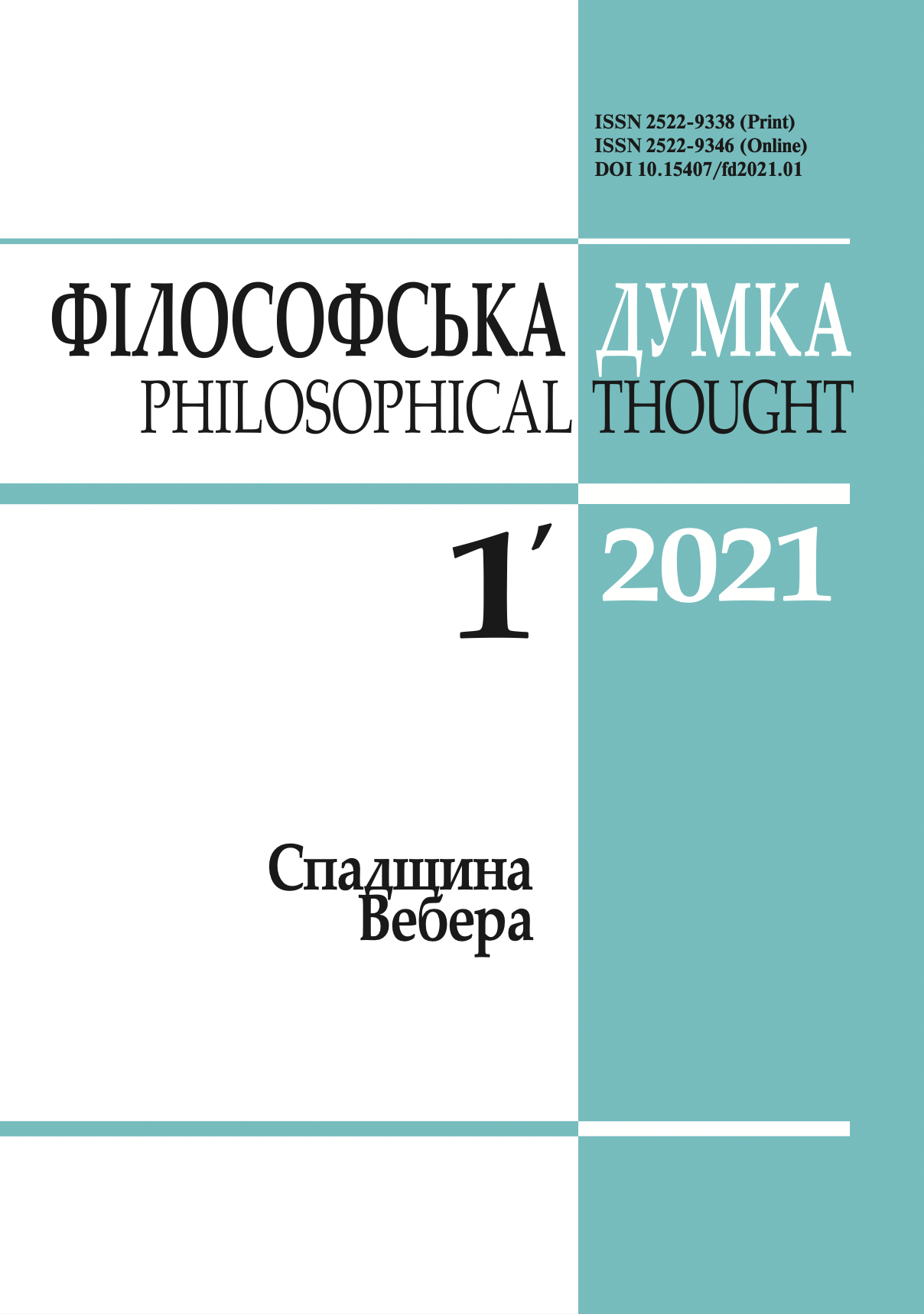Man's vocation as a topic of Weber's thought
Weber's legacy: at the crossroads of traditions
DOI:
https://doi.org/10.15407/fd2021.01.096Keywords:
calling, personality, ethics of conviction and ethics of responsibility, value and purpose oriented rationality, social action, moralityAbstract
The article explicates the significance of M. Weber’s works for understanding of calling as an important world view idea of the European culture. The author observes Weber’s analysis of forming of the notion of calling in the times of ancient Egypt state and Judaic captivity as well as in the Old Testament and its interpretations by M. Luther. Particularly significant for the understanding of social processes during the Reformation in Europe and then in America became Weber’s analysis of the transformation of the religious meaning of calling as “task” and “mission” of a man in the world into the motivation for a practical professional activity. The study shows the ways of implementation of Weber’s theory of social action and political leadership within the concept of calling. The internal collision of the experience of calling is explicated by the examples of charismatic leadership, responsibility of a politician and ethos of a scientist. Combination of affective motivation, value and target oriented rationality in the calling forms the problem for a decision, although this complexity is a driving force of the realization of calling by a person. The philosophical and theological substratum of the Weber’s concept of calling is his looking for the integration of temporal and eternal dimensions in human existence. Calling as an idea of postreformational European culture serves for finding and realization of the meaning of personal life as well as for legitimation of social action. Especially this idea grounds the possibility and necessity of conciliation of the ethics of conviction and the ethics of responsibility in individual as well as in social existence and morality.
References
Weber, М. (1994). The Protestant ethics and the spirit of capitalism. Transl. from German О. Poho- rilyi. [In Ukrainian]. Кyiv: Оsnovy.
Weber, М. (1998a). Calling to Politics. In: M. Weber. Sociology. Universal Historical Analyses. Politics. Transl. from German О. Pohorilyi. [In Ukrainian]. Кyiv: Оsnovy, 173-191.
Weber, М. (1998b). On the Internal Calling to Science. In: M. Weber. Sociology. Universal Histo- rical Analyses. Politics. Transl. from German О. Pohorilyi. [In Ukrainian]. Кyiv: Оsnovy, 310-317.
Vishnevskiy, S. U. (2012). М.Weber and Formation of Sociological Category of "Calling". [In Russian]. Discussion. The Journal of Scientific Publications, 4 (22), 74-81.
Yermolenko, А. N. (1994). Ethics of Responsibility and Human Social Existence (Contemporary German Practical Philosophy). [In Russian]. Кyiv: Naukova Dumka.
Yermolenko, А. М. (2020). German Political Philosophy: Moral and Ethical Aspect. [In Ukrainian]. Philosophical Thought. 3, 6-16.
https://doi.org/10.15407/fd2020.03.006
Jonas, H. (2001). The Principle of Responsibility. In the Search of Ethics for Technological Civilization. Transl. from German A. Yermolenko. [In Ukrainian]. Кyiv: Libra.
Muliarchuk, Y. (2019). Calling and Ethical Responsibility of a Person: Approaching to the Theme of the Other in the Philosophy of Levinas. [In Ukrainian]. Visnyk of Kharkiv na- tional pedagogical university named after H. Skovoroda "Philosophy", 52 (part 1), 100-111.
Rohozha, М. М. (2018). The mоdi of the idea of responsibility in the social and cultural condi- tions of the middle of the 20 - at the beginning of the 21 century. Part 1. [In Ukrainian]. Ukrainian cultural studies, 2(3), 47-54.
https://doi.org/10.17721/UCS.2018.2(3).09
Troitskiy, K. Y. (2016). Max Weber's Ethical Ideas. [In Russian]. Moscow, IFRAN.
Shutova, E. А. (2009). The phenomenon of calling in the works of M. Weber. [In Russian]. Vestnik of Cheliabinskiy state university, 18 (156). Philosophy. Sociology. Cultural Studies, 12, 116-118.
Downloads
-
PDF (Українська)
Downloads: 464
Published
How to Cite
Issue
Section
License
Authors who publish with this journal agree to the following terms:
- Authors retain copyright and grant the journal right of first publication.
- Authors are able to enter into separate, additional contractual arrangements for the non-exclusive distribution of the journal's published version of the work (e.g., post it to an institutional repository or publish it in a book), with an acknowledgement of its initial publication in this journal.
- Authors are permitted and encouraged to post their work online (e.g., in institutional repositories or on their website) prior to and during the submission process, as it can lead to productive exchanges, as well as earlier and greater citation of published work (See The Effect of Open Access).


